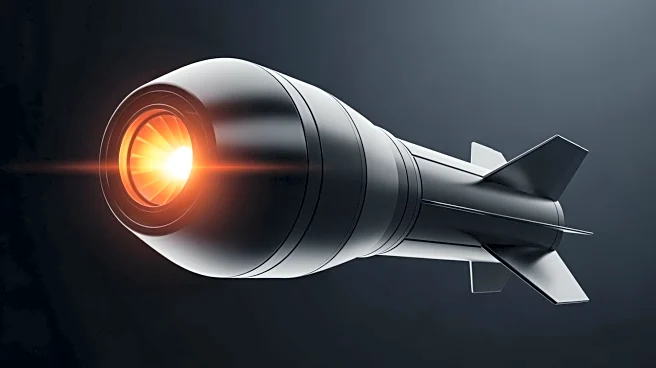What's Happening?
Russia has conducted a test of its nuclear-powered Burevestnik cruise missile, as announced by Chief of General Staff Valery Gerasimov to President Vladimir Putin. The missile, which reportedly flew for 15 hours covering a distance of 14,000 kilometers,
is designed to have an unlimited range and evade missile defenses. This test, claimed to be successful, follows a series of previous tests since 2016, of which only two were partially successful. The missile's capabilities, including its ability to maneuver vertically and horizontally, were evaluated during the test. Despite these claims, Western experts have expressed skepticism about the missile's strategic value and the veracity of Russia's success claims.
Why It's Important?
The test of the Burevestnik missile is significant as it underscores Russia's ongoing efforts to enhance its strategic military capabilities. The missile's potential to evade missile defenses and its purported unlimited range pose a challenge to global security dynamics, particularly for the United States and its allies. If operational, the missile could reach targets across the globe, including the continental U.S., from anywhere in Russia. This development could lead to increased tensions and an arms race, as other nations may seek to develop or enhance their own defense systems in response. The test also highlights the technical challenges Russia faces in making the missile viable, as previous tests have resulted in failures and accidents.
What's Next?
The international community, particularly the United States and NATO, is likely to closely monitor further developments regarding the Burevestnik missile. Diplomatic and military responses may be considered to address the potential threat posed by this missile. Additionally, arms control discussions could be impacted, as the missile's capabilities may necessitate new agreements or revisions to existing treaties. Russia's continued testing and development of the missile will be a focal point for intelligence and defense agencies worldwide.
Beyond the Headlines
The ethical and environmental implications of a nuclear-powered missile are significant. The potential for accidents during testing or deployment could have catastrophic consequences, not only for Russia but for the global community. The development of such weapons raises questions about the direction of military technology and the balance between national security and global safety. Furthermore, the missile's existence may influence public opinion and policy regarding nuclear weapons and defense strategies.
















